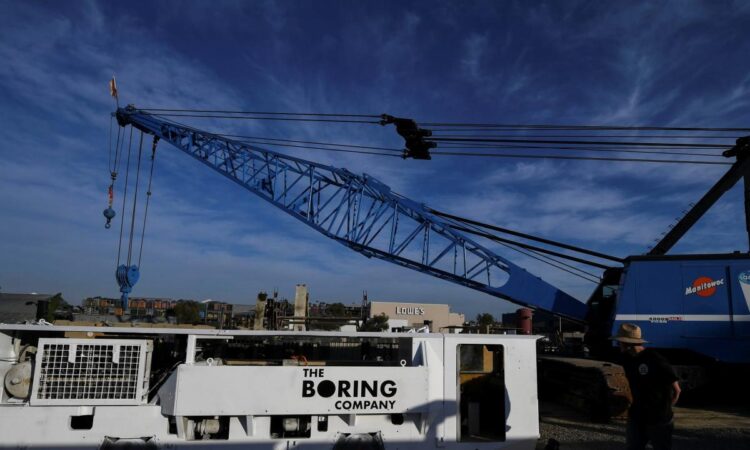Facebook’s Failure To Transform The Railroad Could Be A Warning For A Dull Company

By Adink
Facebook spent US$20 million planning to revive a railroad bridge near its office to improve traffic.
The project, abandoned due to political pressure, may be a harbinger of the future of The Boring Company.
Elon Musk’s tunnel infrastructure company has only completed one known project
Facebook’s failed plans to revive an old railroad bridge to reduce traffic congestion near its offices are among the latest issues facing future-oriented tech companies as they try to solve transportation problems.
The social media firm planned to renovate the Dumbarton Rail Bridge – a disused railroad that spans the San Francisco Bay – after acquiring Instagram and Whatsapp, increasing its workforce nearly tenfold in six years, from 3,200 in 2011 to over 25,000 employees by 2017.
The bridge was intended to ease heavy traffic to the headquarters and expand Facebook’s real estate portfolio by renovating a railroad that had been dormant for 40 years.
The US$20 million project – initiated in 2017 and abandoned in 2020 due to political obstacles and COVID-19 complications, according to The New York Times, which on Saturday released details of the failed project – could be a glimpse into the future Elona Musk’s Boring Company, which was described by The Wall Street Journal as a “ghost” of major US cities withdrawing from proposals to build tunnel systems.
The Boring Company, an infrastructure company that started as a subsidiary of SpaceX before splitting in 2018, has been promising from the start to build high-speed tunnels in major cities to reduce traffic and improve pedestrian access. He raised US$657 million in Series C investments, giving the company a valuation of nearly US$5.7 billion.
Since completing a test R&D tunnel in Hawthorne, CA in 2018, The Boring Company has only completed one project open to the public: a 1.7-mile loop connecting the Las Vegas Convention Center campuses to the Exhibition Hall.
Plans for other tunnels – including projects in Los Angeles linking Washington to Baltimore and from Chicago Airport to downtown – have been rejected by The Boring Company.
Los Angeles proposals to build tunnels under congested Highway 405 and near Dodger Stadium were abandoned in 2018 and 2021.
The DC-to-Baltimore transit system, announced in 2017, was canceled in 2021 due to issues with the environmental review and permitting processes for delays, The Washington Post reported.
In Chicago, The Boring Company’s 2018 bid to build high-speed tunnels to O’Hare Airport was rejected by June 2021 after public criticism of the lack of transparency surrounding the untested technology, The Chicago Business Journal reports.
“Every time I see him on TV with a new project or whatever, I’m like, Oh, I remember that train to Chicago O’Hare,” Chicago City Council member Scott Waguespack reported to The Wall Street Journal, referring to Musk .
Former senior executives at The Boring Company say the company is struggling to retain engineers and technical staff, given Musk’s harsh leadership style, which includes working 120-hour weeks and sleeping on couches in his factories and expecting workers to do the same.
The Boring Company was formed after a series of seemingly pranks tweets from 2016 sent in the early hours of the morning by Musk, in which he complained about traffic jams and promised to start digging tunnels.
“Traffic drives me crazy. I’m going to build a tunnel boring machine and just start digging…” he said sent at 5:05 A few hours later he added “I’m actually going to do that.”
While reporters and consumers immediately questioned whether Musk was serious about creating The Boring Company, early advances in its development silenced critics for several years.
Now on its website, the only currently listed tunnel projects include modifications to the Las Vegas Loop. It is unclear if The Boring Company will make additional bids for tunnel projects in the future or complete planned additions to Vegas Loop.
Online, critics are voicing pole that the whole company was fraud” or “bait and change which was “designed to propose automotive alternatives to mass transit projects” and steer business towards his electric vehicle company, Tesla.
Despite the failed plan to implement the Dumbarton Rail Bridge project, Facebook continued with massive infrastructure projects, mainly in the form of the purchase and development of submarine cables.
According to Fair Internet Report, a market research firm, the social media company, renamed Meta since it started developing cables and dropped the bridge plan, has acquired 6 per cent of operating cable routes worldwide from 2022 until the completion of the 2Africa infrastructure project, Meta will own more than 13 per cent of the world’s submarine cable infrastructure, spanning 33 countries and affecting 36 per cent of the global population.
While the future of The Boring Company’s tunnels remains unclear, it appears Musk will continue to try to innovate existing infrastructure through his many businesses – including plans to use Tesla’s energy storage technology to “shift the entire energy and transportation infrastructure on earth,” Electrek. the transport information service reported.
Representatives from Facebook and The Boring Company did not immediately respond to Insider’s requests for comment.






